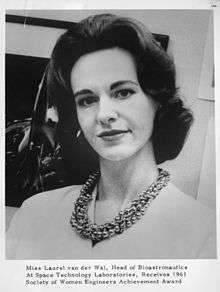Laurel van der Wal
Laurel van der Wal (September 22, 1924 – August 13, 2009) was an American aeronautical engineer who worked to solve the challenges of maintaining human life in space.
Laurel van der Wal | |
|---|---|
 Laurel van der Wal, Smithsonian Institution Archives. | |
| Born | September 22, 1924 San Francisco, California |
| Died | August 13, 2009 (aged 84) |
| Nationality | American |
| Other names | Laurel Roennau |
| Alma mater | University of California Berkeley |
| Known for | bioastronautics research |
| Spouse(s) | William Henry Roennau (divorced) |
| Scientific career | |
| Fields | Aeronautical engineering |
Early life and education
Laurel van der Wal was born in San Francisco, the daughter of Lillian and Richard van der Wal, both from Spokane, Washington. Her mother was a former teacher and an alumna of the University of Washington; her father was a businessman.[1] She graduated from high school at age 15, and worked as a model, an art instructor, a deputy sheriff, a showgirl, a railroad switch tower operator, and a casino shill as a young woman. "I am impatient with people who do not make full use of all their capabilities," she explained in 1962.[2] She admired pilots and hoped to earn a pilot license, but instead worked as an aircraft mechanic during World War II, at Hamilton Air Force Base. She decided to pursue further education in mechanical engineering at the University of California Berkeley, where she earned a bachelor's degree in 1949, with honors. Her graduate education was funded in part by a National Research Council fellowship to study aeronautics in Stockholm, Sweden.[3]
Career
As a young engineer van der Wal worked at Douglas Aircraft as a data analyst on the Nike missile program, and later designing missile systems for the Ramo-Wooldridge Corporation. Starting in 1958, she was the project engineer on three MIA (Mouse-in-Able) launches from Cape Canaveral, as head of bioastronautics at Space Technology Laboratories. She was named the Los Angeles Times's "1960 Woman of the Year in Science" for her work. When asked if she would want to go into space herself, she answered, "I'd go in a minute, if they'd let me."[3] In 1961 she was honored as "outstanding woman scientist" by the Wives' Wing of the Aerospace Medical Association.[4] That same year, she won the Society of Women Engineers Achievement Award.[5]
Van der Wal was the first woman appointed to the Los Angeles Board of Airport Commissioners, in 1961, and served as a commissioner until 1967.[6][7]
Laurel van der Wal was director of the Southern California chapter of the American Rocket Society, where she took particular interest in partnering with Explorer Scouts to teach children about space and aeronautics. "Kids all over the world are excited about space," she explained in 1960, "because this is the challenge to their generation."[8] As the space program gained popularity in the 1960s, van der Wal was a popular speaker at women's clubs, teachers' meetings, and other events.[9][10][11]
In the early 1970s she wrote several reports for the Rand Corporation about transportation planning.[12] In 1974 she took a job doing transportation planning in Nigeria, but she discovered on arrival that the government had changed and she was no longer employed there. She returned to Los Angeles to work for the Southern California Association of Governments for twelve years. In her later years, she was a noted activist on behalf of slow growth in Santa Monica, California, and was an advisor to the Santa Monica Coalition for a Liveable City.[13]
Personal life
Laurel van der Wal married fellow engineer William Henry Roennau in 1961, in Arlington, Virginia.[14] The Roennaus had two sons, Jonathan and Michael.[15] They later divorced. She retired in the late 1980s, and died in August, 2009, in Santa Monica.[16]
References
- "Society News," Morning Oregonian (June 21, 1919): 10.
- Joan Sweeney, "Work by Woman Scientist Helped Prepare Way for Manned Flights," Franklin Evening Star (June 21, 1962): 14. via Newspapers.com

- Marvin Miles, "Miss Van der Wal Probes Problems of Life in Space," Los Angeles Times (January 23, 1961): A1.
- "Space Doctors Gathering Here for 4 Day Meeting," Los Angeles Times (April 24, 1961): b13.
- "Women are Finding a Place in Space," Sandusky Register (August 22, 1961): 11. via Newspapers.com

- "Outer Space May Also Come within Realm of Woman's World," Los Angeles Times (October 8, 1961): CS1.
- "Mrs. Laurel van der Wal Roennau," City of Los Angeles Officials database.
- Mary Lou Loper, "Woman Explores Science's Frontier," Los Angeles Times (August 7, 1960): H1.
- Judith Cass, "150 Hear Space Talk by Woman," Los Angeles Times (October 22, 1965): b19.
- "Top Space Scientist Will Speak," (March 18, 1962): H10.
- "Woman Space Scientist to Lecture at SOC," Medford Mail Tribune (July 23, 1961): 9. via Newspapers.com

- "Laurel V. Roennau". RAND.org. Retrieved 2016-02-16.
- Peggy Clifford, "Laurel Roennau Dies Thursday," Archived 2015-04-02 at the Wayback Machine Santa Monica Dispatch (August 14, 2009).]
- "Laurel Van Der Wal Married to William Henry Roennau," Los Angeles Times (December 1, 1961): A1.
- Jean Ward, "Scientist Offers 5 Pointers for Getting Most from Life," Los Angeles Times (June 5, 1966): ws20.
- Jorge Casuso, "Leading Santa Monica Slow Growth Activist Dies," The Lookout News (August 26, 2009).